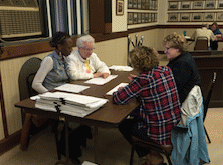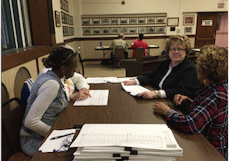VM: I cannot imagine why what Columbia County does could not be done in a larger jurisdiction. It's just a matter of hiring people who can read and write and count, and then managing the process. People seem to recoil at the notion of hand-counting many thousands of ballots. We've done 30,000 ballots without any particular problem. Why is reading, writing, and counting, and then aggregating that data, thought to be so very difficult? That's the public's opportunity to watch every step and confirm that what we've done is accurate. It costs us a few thousand dollars to count those 30,000 ballots, which is a pretty good deal when you consider that the public then has full confidence in the result. How many government agencies engender that kind of respect and confidence? The process takes a few days to a week. And it puts some local people to work, doing a civic duty and confirming to themselves and their party that the process is on the up and up. I'd much rather pay people to do that work than pay a far-off vendor to sell us a product--made offshore or clear across the country--the internal workings of which are hidden to my view, my counterpart's view, and the public's view. Something that can break down, either visibly or not.
Certainly it would be an undertaking for New York City, for example, to do this. But let's say New York City, with about 100 times the number of voters in Columbia County, has 100 times the resources we do. I fail to understand why they could not make it work with the resources at their disposal when we can make it work with the resources at ours. It's just reading, writing, counting, aggregating, and managing. We can put a [man] on the moon but we can't hand-count voters' ballots?
So it takes a few days to a week to get final numbers. We don't have certifiable numbers until all our absentee ballots have been received, anyway, so there's no holdup in terms of time. We already have a good sense of the election-day voters' choices because the machines provide results on election night, and they have been an excellent predictor of the final results. I don't see where the problem is.

Dems and Repubs monitor one another in hand-counting, GE 2015
(Image by Virginia Martin) Details DMCA
JB: When you put it like that, it makes perfect sense, Virginia. You're very convincing. Too bad you weren't with me when I recently interviewed Barbara Simons of Verified Voting and asked her about the feasibility of using your system where they are [in California]!
VM: I'm interested in knowing why people believe hand counting in a large jurisdiction is not feasible. I'm sure they have their reasons, and they must seem like good ones, but I certainly don't know what they are.
JB: These days, the reality is that elections are often called before the polls have closed, and obviously, before all the votes have been counted. How does that "gotta have it now" mentality fit with making sure each vote is counted, not to mention the hand counting which takes much longer, with results coming in long after the "results" have been announced?
VM: On election night, we're careful to state that any results we post are unofficial. That's because we need to audit the machine results and because we have absentee and affidavit (provisional) ballots yet to count. In larger races, such as federal or statewide, it seems that races are called by the media on election night, presumably because there's a wide margin (that everyone trusts). However, in New York State we don't certify our results until 25 days post-election. I suppose other states have similar requirements.
In terms of our hand-count audit, it's completed, at the latest, one week after the election, and always before we begin counting absentee and affidavit ballots, which begins one to two weeks post-election, depending on whether it's a primary or general election. The audit is not holding anyone up.
It is both frustrating and distressing that the media are increasingly insistent on instantaneous results. After the November 2015 election, we posted our unofficial results, as is typical, an hour and a half after the polls closed, but still our two area newspapers lambasted us for being "slow"--which I found positively incredible. Other countries wait days, weeks, even, for their results. How long do campaigns take? A year, two years. Four years. What's a couple of hours to wait for results? Why the artificial time constraint? Further, I can't fathom why a week would be too long to wait to know precisely what the voters said on election day. An approximation--so far, in our experience, a very good approximation--of their statement is available within hours after the election.
JB: I couldn't agree more. Anything you'd like to add before we wrap this up?
VM: I'm heartened that increasing numbers of voters see the value in hand-counting the ballots. I'm happy to share what we do in Columbia County. Knowing that my county provides a fully transparent count isn't enough. I want to know that other states do, too. How other states are governed, and whom they elect for Congress and the presidency, is of crucial importance to me, as it should be to everyone.
I think also that there's been a shift in just how comfortable people are about having paper ballots to "fall back on if needed." Some who initially felt that the mere existence of those ballots would provide sufficient protection of the vote, because they were "available" for recounting, have come to recognize that it's practically impossible to get a board of elections to permit a public recount of computer-tallied results. As far as I know, no judge in New York State, for example, has ever granted an order for a recount. So, if some people are dissatisfied with the accuracy of the results, their chances of "falling back on" those ballots are slim to none. Which leaves a dissatisfied voting public.
We could end a lot of the acrimony and distrust associated with elections, and with our governance, if elections were more transparent. Of course every election will have its losers, no matter how the count is conducted. But when losers can see with their own eyes that they truly lost, that the electorate really did vote against them, then they trust the process. Then, they're reassured that democracy is alive and well for them.

Switching roles: clockwise from L, front: Dem, Rep, Rep (looking at camera), Dem (in plaid shirt)
(Image by Virginia Martin) Details DMCA
(Note: You can view every article as one long page if you sign up as an Advocate Member, or higher).





